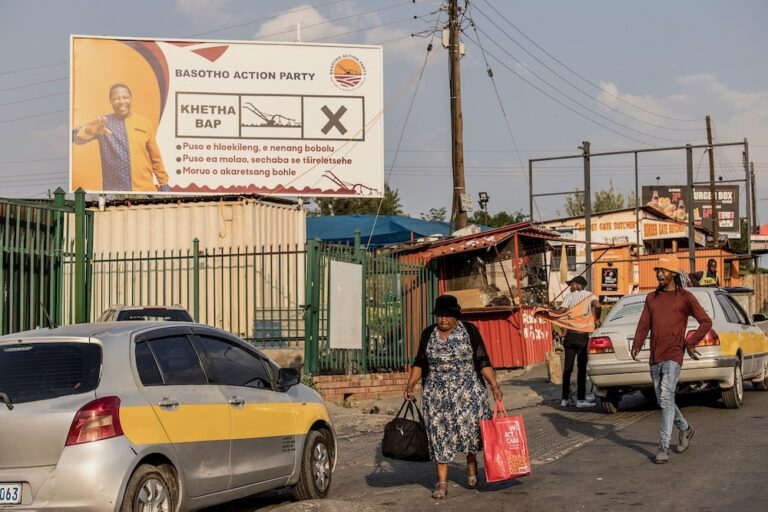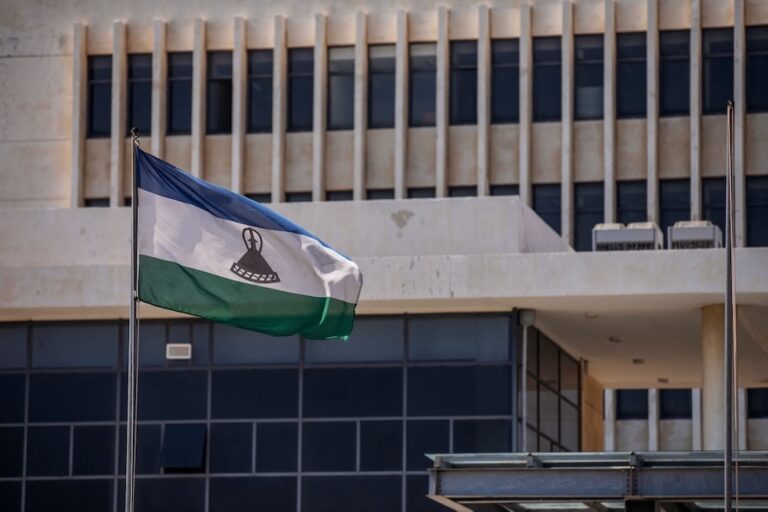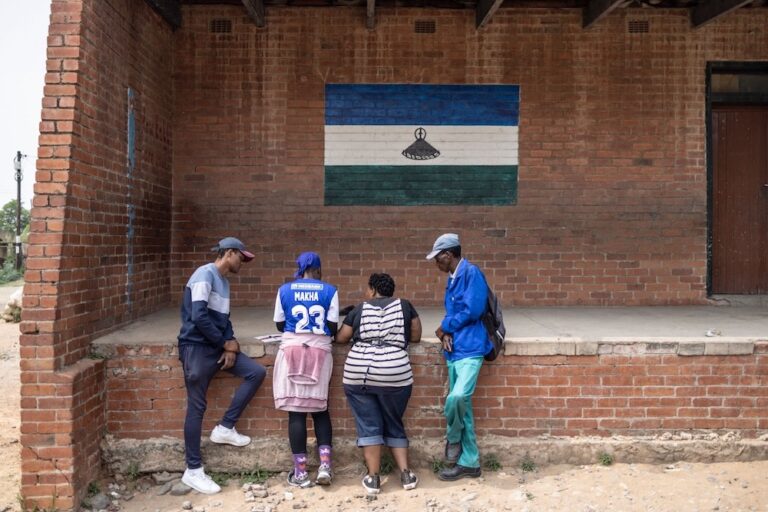(MISA/IFEX) – The independent press in Lesotho continues to suffer as a result of the crisis which engulfed the country in September 1998. However, they have not been cowered into silence and continue to publish despite many obstacles. **For background to the independent media’s recent troubles in Lesotho, see IFEX alerts of 13 October, 1 […]
(MISA/IFEX) – The independent press in Lesotho continues to suffer as a
result of the
crisis which engulfed the country in September 1998. However, they have not
been cowered into silence and continue to publish despite many obstacles.
**For background to the independent media’s recent troubles in Lesotho, see
IFEX alerts of 13 October, 1 October and 29 September 1998**
Lesotho’s six independent newspapers, who were all affected by the looting
and burning which followed the country’s virtual invasion by South African
and Botswanan troops, are caught in a vicious circle of mounting losses and
unforeseen expenses.
Two of the worst affected newspapers, “MoAfrika” and the “Sun/Thebe”, whose
offices were both burnt down, have been able to relocate to other offices
but now face the prospect of prohibitive rent. “Southern Star”, whose
offices were also completely burnt down, has to date not found new office
space.
Candi Ratabane Ramainoane, editor of “MoAfrika”, told MISA that following
the destruction of numerous buildings in the Maseru city centre, the lack of
available space had resulted in a considerable hike in rent costs. Both
“MoAfrika” and the “Sun” have only missed publication of one or two issues,
while “Thebe”, the SeSotho-language sister newspaper of the “Sun”, has not
been published since September due to a lack of
advertising. Both newspapers, however, are still having to work with an
alarming lack of equipment, most of which was also destroyed during the
burning and looting.
Both newspapers, along with another independent newspaper, “Public Eye”, are
operating without any computers. In addition, these and other newspapers
such as “Mopheme” and the “Mirror”, have had all their phone lines
destroyed. The Lesotho Chapter of MISA, MILES, which escaped the ravages of
the mob, is providing some relief by making its equipment available to needy
publications. The Director of MILES, Bethuel Thai, reports that at least
four newspapers, “MoAfrika”, “Public Eye”, the “Mirror” and “Mopheme”,
continue to use the MILES offices variously for access to computers,
telephones, fax and e-mail.
The lack of advertising and losses stemming from unpaid advertising bills
continue to affect all the independent papers. Keketso Lawrance, managing
editor of “Mopheme”, told MISA that businesses which had advertised in his
paper but which had subsequently been destroyed where unable to settle their
bills, while several destroyed businesses had also booked space but
obviously could not proceed with their commitments. This scenario was echoed
by other newspapers. Two senior journalists from the “Mirror” interviewed by
MISA reported that their newspaper had lost at least R15 000 (US$ 2 550) due
to advertising losses alone. The losses are compounded by a standing
government directive to its ministries and parastatals not to advertise in
certain papers considered to be critical of the ruling party.
While having to contend with this harsh economic environment, the current
political environment in Lesotho is also proving very harsh for free media
activity. Both government and independent journalists are faced with the
prospects of attacks or intimidation when seen at the wrong place or
reporting on certain matters.
With respect to government journalists, they are still reeling from the 7
October instruction by the Minister of Telecommunications, ‘Nyane Mphafi,
that all state-employed journalists who “were seen at the opposition
demonstrations” should write letters of resignation or face summary
dismissal. The editor of the government-owned weekly “Lentsoe La Basotho”,
Khahliso Lesenyane, informed MISA that while nothing further had transpired
following the minister’s threat, it had effectively scared off
state-employed journalists from covering opposition rallies and events. A
senior journalist from the state-owned Lesotho News Agency (LENA), speaking
on condition of anonymity, told MISA that journalists at LENA had been
informed that they could not
report on anything relating to the political situation except for official
statements from government.
Independent journalists and publications, on the other hand face a wide
range of obstacles inhibiting their ability to freely report on matters in
Lesotho. Ramainoane reports that in recent months there has been an alarming
increase in violence and intolerance from political parties in Lesotho, and
particularly from the ruling Lesotho Congress for Democracy (LCD) party.
“Generally there is a lot of self-censorship and restraint because of fear.
Many rallies, either by the ruling party or the opposition, are not being
covered because of the fear of not being seen in a particular place,”
reports Ramainoane. He told MISA further that one of his reporters had been
beaten up at an LCD rally between 10 and 17 August this year, while this
same reporter had also been beaten up at a police roadblock simply because
he was a reporter for “MoAfrika”.
Other journalists interviewed by MISA said that reporting on military and
security matters was very difficult because they had to go through numerous
security checks before reaching an official spokesperson. Women journalists
also felt particularly threatened in investigating matters involving the
South African and Botswanan invasion forces because of numerous allegations
of rape involving these troops. In addition, Lesenyane of the government
weekly told MISA that any reports on the allegations of atrocities committed
by the invading forces had to be passed by the Permanent Secretary in the
Minister of Information first.
A flicker of hope for greater media freedom and equitable reporting on
political matters in Lesotho lies perhaps in the newly introduced Interim
Political Authority Bill. The Bill, which was introduced for discussion in
the Lesotho Parliament on 30 October, stemmed from mediated talks between
the government and opposition parties. It makes provision for an Interim
Political Authority with executive powers and which will exist alongside
the current government until fresh elections are held in eighteen months
time. The authority will be tasked, among others, with “creating and
promoting conditions conducive to the holding of free and fair elections;
eliminating any impediments to legitimate political activity; [and] ensuring
equal treatment of all political parties and candidates by all governmental
institutions and in particular by all government-owned media, prior to and
during the elections.”
Government media representatives interviewed by MISA welcomed the
introduction of the Bill, saying it would free them of the ruling-party
stranglehold on their media allowing them to give greater coverage to all
the political players in the country. They were also confident that they
would live up to the expectation of providing fair and equitable coverage on
political matters in the run up to the election.
The independent journalists interviewed by MISA, however, were not so
confident about this. “Similar laws as those contained in the current Bill
requiring fair and equitable treatment of political parties was contained
in the previous Electoral Act, yet this was not done. Opposition parties and
candidates were given minimal space in the government media, particularly on
radio and television,” said Ramainoane.
The current political situation in Lesotho and the sudden predicament of a
“pre-election” period begs for urgent intervention and support for the
independent media in Lesotho. The government continues to enjoy a monopoly
over the airwaves and despite several radio licences having been issued by
the Ministry of Information earlier this year, none of these stations are on
air. If the harsh economic environment facing independent publications in
Lesotho persists, and in the absence of any outside support, some of
these publications may face closure, thus striking a blow to the information
needs of the Lesotho people while also reducing the chances of more vigorous
reporting on political matters and parties in the run-up to the elections.
The independent publications affected by the political crisis in Lesotho
are:
“MoAfrika”
“Mopheme”
“Southern Star”
“The Sun/Thebe”
“Public Eye”
“The Mirror”


